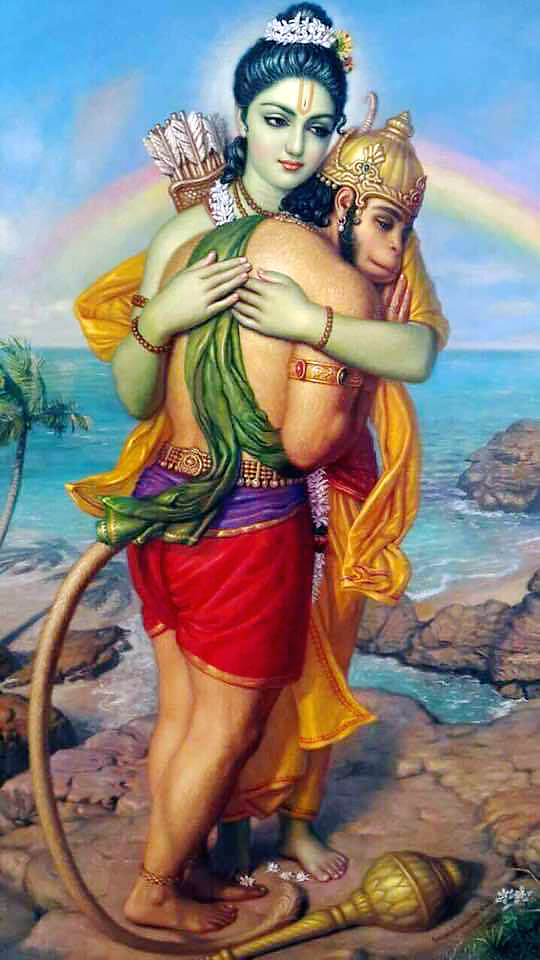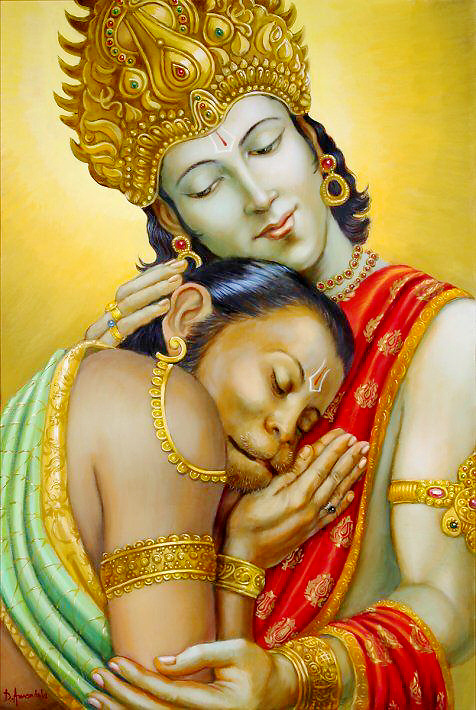Hanumān’s Devotion to Lord Rāma
In a verse in the Rāmāyaṇa, Hanumān, the great devotee of Rāma, said, “I know that there is no difference between the Sītā-Rāma and Lakṣmī-Nārāyaṇa forms of the Supreme Personality of Godhead, but nevertheless, the form of Rāma and Sītā has absorbed my affection and love. Therefore I want to see the Lord in the forms of Rāma and Sītā.” Similarly, the Gauḍīya Vaiṣṇava loves the forms of Rādhā and Kṛṣṇa, and Kṛṣṇa and Rukmiṇī at Dvārakā. The words bhaktānām anurūpātma-darśanam mean that the Lord is always pleased to favor the devotee in the particular form in which the devotee wants to worship and render service unto Him. (sb/3/20/25)
All the forms of the Lord are eternal. It is the devotee’s inclination to worship a particular form, and he engages in devotional service to that form.
In the Brahma-saṁhitā it is stated that the Lord is one Absolute, but He has ananta, or innumerable, forms. Advaitam acyutam anādim ananta-rūpam [Bs 5.33]. The Lord is the original form, but still He has multiforms. Those multiforms are manifested by Him transcendentally, according to the tastes of His multidevotees.
The Tenth Chapter of Śrīmad-Bhāgavatam describes how Lord Rāmacandra appeared in the dynasty of Mahārāja Khaṭvāṅga. It also describes the Lord’s activities, telling how He killed Rāvaṇa and returned to Ayodhyā, the capital of His kingdom.
The son of Mahārāja Khaṭvāṅga was Dīrghabāhu, and his son was Raghu. The son of Raghu was Aja, the son of Aja was Daśaratha, and the son of Daśaratha was Lord Rāmacandra, the Supreme Personality of Godhead. When the Lord descended into this world in His full quadruple expansion—as Lord Rāmacandra, Lakṣmaṇa, Bharata and Śatrughna—great sages like Vālmīki who were actually in knowledge of the Absolute Truth described His transcendental pastimes. Śrīla Śukadeva Gosvāmī describes these pastimes in brief.
Lord Rāmacandra went with Viśvāmitra and killed Rākṣasas like Mārīca. After breaking the stout and strong bow known as Haradhanu, the Lord married mother Sītā and cut down the prestige of Paraśurāma. To obey the order of His father, He entered the forest, accompanied by Lakṣmaṇa and Sītā. There He cut off the nose of Śūrpaṇakhā and killed the associates of Rāvaṇa, headed by Khara and Dūṣaṇa. Rāvaṇa’s kidnapping of Sītādevī was the beginning of this demon’s misfortune. When Mārīca assumed the form of a golden deer, Lord Rāmacandra went to bring the deer to please Sītādevī, but in the meantime Rāvaṇa took advantage of the Lord’s absence to kidnap her. When Sītādevī was kidnapped, Lord Rāmacandra, accompanied by Lakṣmaṇa, searched for her throughout the forest. In the course of this search, They met Jaṭāyu. Then the Lord killed the demon Kabandha and the commander Vāli and established a friendly relationship with Sugrīva. After organizing the military strength of the monkeys and going with them to the shore of the sea, the Lord awaited the arrival of Samudra, the ocean personified, but when Samudra did not come, the Lord, the master of Samudra, became angry. Then Samudra came to the Lord with great haste and surrendered to Him, wanting to help Him in every way. The Lord then attempted to bridge the ocean, and, with the help of advice from Vibhīṣaṇa, He attacked Rāvaṇa’s capital, Laṅkā. Previously, Hanumān, the eternal servant of the Lord, had set fire to Laṅkā, and now, with the help of Lakṣmaṇa, the forces of Lord Rāmacandra killed all the Rākṣasa soldiers. Then Lord Rāmacandra personally killed Rāvaṇa. Mandodarī and other wives lamented for Rāvaṇa, and in accordance with Lord Rāmacandra’s order, Vibhīṣaṇa performed the funeral ceremonies for all the dead in the family. Lord Rāmacandra then gave Vibhīṣaṇa the right to rule Laṅkā and also granted him a long duration of life. The Lord delivered Sītādevī from the Aśoka forest and carried her in a flower airplane to His capital Ayodhyā, where He was received by His brother Bharata. When Lord Rāmacandra entered Ayodhyā, Bharata brought His wooden shoes, Vibhīṣaṇa and Sugrīva held a whisk and fan, Hanumān carried an umbrella, Śatrughna carried the Lord’s bow and two quivers, and Sītādevī carried a waterpot containing water from holy places. Aṅgada carried a sword, and Jāmbavān (Ṛkṣarāja) carried a shield. After Lord Rāmacandra, accompanied by Lord Lakṣmaṇa and mother Sītādevī, met all His relatives, the great sage Vasiṣṭha enthroned Him as King. The chapter ends with a short description of Lord Rāmacandra’s rule in Ayodhyā.
Meeting of Hanumān and Bhīma:- In Mahābhārata, we find that the Pāṇḍavas were banished to the forest after they were defeated in the game of dice by Duryodhana. And their life in forest is described in the Vana Parva of Mahābhārata. During their stay of 12 years, once Bheema went to a particular area in the forest to pick Sougandhika flowers for Draupadī. At that time, he entered into an area which was meant only for devatās. He also started uprooting the trees in the forest and started disturbing all the living entities there. On the way he saw an old monkey sitting with closed eyes and its tail spread across the pathway of Bhīma. Bhīma said in a haughty voice, “Oh old monkey, get out of my way. Else I will throw you out of this forest.” The monkey replied, “O warrior, please do not enter this area of the forest which is meant only for devatās. I am old and hence cannot move. If you want then please cross over my tail.”
Bhīma replied: “The Supreme Lord who is all pervading is present in everyone’s heart. He is present in your heart too. So I will not disrespect you by crossing over your tail. Else I will cross over you just like Hanumān crossed the ocean.” The monkey replied, “Who is Hanumān? please tell about him to me.” Bhīma replied, “He is servant of Lord Rāma who crossed the ocean.” The monkey replied, “Then please move my tail from your way and then proceed.” Bhīma casually tried to lift the tail of the monkey with his one hand and he could not do it. Then he tried with both hands and finally with all his might. He became tired and fully sweated and could not lift the tail. He was humbled and asked the monkey, “Who are you? You must be a devatā or powerful being.”
At that time old monkey showed its original form as Hanumānjī and Bhīma fell at his feet and asked for forgiveness. Hanumānjī then embraced him and said, “Your embrace reminded me of my eternal master Lord Rāma.” Then both of them conversed on many spiritual subjects and Hanumānjī completely narrated the pastime of Rāmāyaṇa in a nutshell to Bhīma. Bhīma then asked what Hanumānjī is doing in the forest. Hanumānjī recollected the benediction of Rāma and Sītā and how he is blessed by them as follows. (Mahabharata-3.147.37)
yāvad rāma kathā veera bhavel lokeshu satruhan
etāvat jiveyam ityevam tathāstu iti so’ bravīt
sitāprasadāt ca sadā mām ihastham arindama
upatishtanthi dvivyā hi bhoga bhīma yathepsitah
“I asked for the benediction from Rāma, that as long as the story of Rāma exists, I would like to live on this earth and Rāma replied, “So be it”. Mother Sītā blessed me with enjoyments from all heavenly persons as I desire.”
Hanumān is understood to be Cirañjīva, or immortal. At the time of Rāma’s coronation after his return to Ayodhyā Rāma gives a lot of presents to guests who had arrived from Laṅkā and Kiskinda. When it is Hanumān’s turn, he asks Rāma that as a long as someone recites Rāma Nāma on this earth, I want to be alive to be able to listen to it. Rāma grants his wish with a boon to be Cirañjīva or immortal.
So people believe that where ever some one is speaking of Rāma or his story or praying to him Hanumān comes to listen to it.









Speak Your Mind